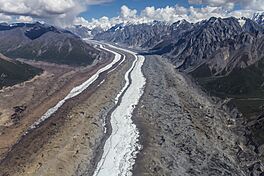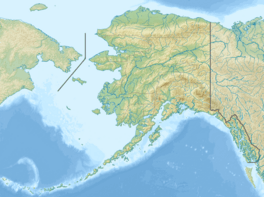Barnard Glacier facts for kids
Quick facts for kids Barnard Glacier |
|
|---|---|
 |
|
| Coordinates | 61°09′54″N 141°34′00″W / 61.16500°N 141.56667°W |
| Length | 53 km (33 mi) |
| Status | Retreating |
Barnard Glacier is a huge river of ice, about 53 kilometers (33 miles) long, found in Alaska, U.S.. It flows southwest towards the Chitina River in the amazing Saint Elias Mountains. This glacier got its name from Barnard College, a famous school in New York, New York.
Contents
Exploring Barnard Glacier's Features
Barnard Glacier is a fascinating natural wonder. It looks like a clean, long tongue of ice. You won't see any piles of rock and dirt (called moraines) on its sides or in the middle.
Where the Glacier Begins
This glacier starts high up in a large bowl-shaped area called a cirque. It connects to a big, uneven mass of ice on a shelf. The northern part of the glacier has smaller ends, or "lobes," that stop at the edge of a hanging valley. A hanging valley is a valley that is higher than the main valley it joins.
Water Flow and Forest Life
Two streams of water flow out from the end of the glacier, which is called the terminus. You can see tall spruce trees growing from the main valley all the way up towards the glacier's end. This tells us that Barnard Glacier hasn't moved much further down into the valley for at least a hundred years.
Signs of Change Over Time
Even though the forest shows the glacier hasn't moved far, there's a clear area without trees between the ice and the forest. This "barren zone" was there in 1899 and also in 1910. This proves that the glacier was actually shrinking, or "retreating," during that time.
Between 1899 and 1910, the southern part of the glacier moved a little bit forward down the edge of the hanging valley. The northern part also moved forward slightly. In the space between these two parts, a pile of ice blocks and rocks formed.
See also
- List of glaciers
 | Kyle Baker |
 | Joseph Yoakum |
 | Laura Wheeler Waring |
 | Henry Ossawa Tanner |


